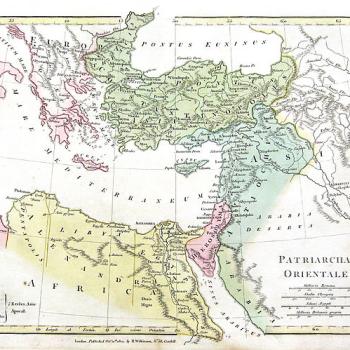But God is supposed to be perfect. God isn't supposed to be forgiven. That's what our religious institutions have told us for eons.
We often think of God as sacrificing God's own son for the forgiveness of the sins of humanity. But there's equal power in seeing God as coming down to live among us and dying for the forgiveness of God as well. My God, my God, why have you forsaken us? How many times have we uttered that phrase in our pain and suffering? When Jesus utters these words, there is no answer. We are left to imagine it. But what would you say if your lover cried out to you, regardless of its factual accuracy, My Beloved, my Beloved, why have you forsaken me? I do not know why, the lover replies. I am so sorry. Forgive me. Do not forsake me as well.
Can we imagine God, the Beloved, replying in such compassion to our experience of suffering? Or do we imagine God, coming out the whirlwind, to berate us like God did to Job?
All relationships need forgiveness. And in a relationship, all need to forgive, whether the wrongs are real or whether the wrongs are imagined, and all need to be forgiven for the same reasons. Perhaps there is some explanation too great for mortals to understand as we are told in Job, but God's answer to Job's pained question of My God, my God, why have you forsaken me always struck me as less than convincing. Perhaps our finity cannot match an understanding of infinity, but regardless, such an understanding doesn't change much when deep suffering strikes.
Sometimes I imagine that when we all finally get to heaven, we'll find God weeping into a bowl of dirty water, washing the feet of humanity, asking for forgiveness for all God has done and left undone in creation, and giving thanks that we decided to come home anyway.
O God, we forgive you for the suffering in the world, for the horror that masquerades as life, for the hunger, the thirst, the loneliness, the absolute silence of your voice. We forgive you of your trespasses against humanity as you forgive ours against you. And in doing so, may we understand that when our hands reach out in evil, your hands do too, that when our hearts reach out in compassion, your heart follows. Amen.
Good Friday: Entering the Darkness
Growing up, I often heard preachers intone that my name was on Jesus' lips when he died on the cross, that, in between spasms of excruciating pain, Jesus was thinking of me. In more macabre sermons, pastors would point a finger at the audience and explain that it was I that drove the nails into Jesus with all of my terrible sins.
It was a powerful, seductive message. It was also a lie.
Jesus didn't die for me. I wasn't even on his divine radar when Roman soldiers drove nails through his body. None of us were. Jesus wasn't crucified for my sins—whatever lie I might have told last week, that pack of M&Ms I nicked as a 7-year-old, those years of my life I look back on with shame. Instead, Jesus died for the simple reason that the Romans wanted him dead, because overturning tables full of money, preaching about the Reign of God and proclaiming a new, eternal kingdom that would trump Rome's didn't promote good, imperial social order. Indeed, Rome had a regular habit of making gruesome examples out of subversives who challenged—or even might have challenged—the empire's status quo.
But Christians, especially on Good Friday, tend to lift the death of Jesus beyond the bounds of reason, imbue it with too much cosmic meaning, and brand it with a singularity that strips it of profound meaning. To me, the death of Jesus isn't significant because it was different or special. Rather, the significance of Jesus' death is in the everyday violence of it, the tragic mundanity of humanity. When we survey that wondrous cross from across 2,000 years, we should remember this, the jarring normalcy of the event, just how unexceptional it was.
And in that moment, Jesus' death waspointless. That is the deep, dangerous power of the cross on Good Friday. Too often we experience Good Friday with Easter on our minds, visions of a honey-baked ham, pastel-colored eggs, cream-filled chocolate, and a trumpet in the choir loft. Too often we tiptoe past the cross on Friday, humming "I Know that My Redeemer Lives," so we don't have to remember that he died, profoundly.
So, in this Good Friday moment, resist the temptation to dwell on the hope of forgiveness through the cross and to fast forward through the dark parts. Don't assuage guilty consciences borne of imperfect, incomplete—human!—lives with sycophantic notions that Jesus died specifically for you and me. There is no power in such saccharine fatuousness. In this moment, don't wrench the cross from the earth, wet with blood and sorrow, and perch it so high in the heavens that we cannot smell the sweat and pain, so high that we cannot see that in his death, Jesus is not unique. Rather, it is in his death that the Jesus of the Gospels becomes one with human, becomes one of us.




